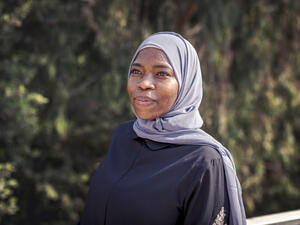UNHCR assists displaced children in Iraq's Kurdistan region
UNHCR assists displaced children in Iraq's Kurdistan region

A Classy Dresser: Lessons start at a school renovated with UNHCR funding in Erbil.
ERBIL, Iraq, October 31 (UNHCR) - In more stable countries, 13-year-old Firas and many of his classmates would probably be attending a school for children with special needs. They would also be benefitting from a much smaller student to teacher ratio.
But this is northern Iraq and these youngsters are just happy to be alive and receiving an education at the Amin Zaki state-run primary school in Erbil, capital of Iraqi Kurdis¬tan. Most of the 1,500 Arabic-speaking pupils fled their homes in Baghdad, Diyala, Kirkuk and Mosul after the eruption of sectarian violence in 2006.
"Many of the children in the school have been deeply traumatized by violence in our country," explained senior staff member Nazifa. "Some saw their fa¬thers killed. They are not fit to be in a normal school; they need special schools with psycho-social counsel¬ling. But we don't have those services here."
Firas did not lose any close family members, but he saw the war up close and ugly. A bomb exploded outside his school in Baghdad in 2007 and he still has nightmares about the traumatic experience. His family decided to leave the Iraqi capital because of the deteriorating security situation at that time.
The teenager's parents are happy that he can now continue his education, but he should be receiving special care for his trauma. What's more, the situation at the school has been far from ideal because of the arrival of significant numbers of students fleeing from insecurity in other parts of Iraq in recent years.
There are simply too many students. And overcrowding is a problem that affects most schools in this region. At the Shlama Primary School, also in central Erbil, the overworked teachers complain that having 40 to 50 pupils per class is too much. The average class size for primary schools in the developed world is 22.
Many of the students simply get left behind, the teachers say, while adding that the school infrastructure cannot cope with so many people. Moreover, with so many children per class, the Arabic school has to run a shift system - some children attend in the morning and the rest come in the afternoon.
Fire-damaged classrooms at the Shlama school were renovated last year with funding from UNHCR, which has also carried out repairs at the Amin Zaki school. Shlama's 52 teachers, all internally displaced civilians from Baghdad, are grateful to have jobs, but say it is difficult to make ends meet on an average monthly salary of US$450.
"My rent is US$400 in Erbil and I am happy that my husband found daily labouring work, otherwise it would not be possible to survive," explains Ana, who also sets aside a small portion of her income to help the poorest students get to school by bus. Finding Arabic schools near their new homes in this predominantly Kurdish-speaking region has been difficult for some families.
Most of the displaced families have limited financial resourc¬es and cannot afford to live near the Arabic schools in central Erbil or to pay the US$50 monthly transport fees. "It's not always possible to pay for transportation fees for all the needy children," notes Ana. "So some of them stay at home," she adds.
Although the tuition at state schools is free, families have to pay for uniforms and school supplies. UNHCR is looking at ways to help families struggling to pay for transportation and other school-related costs. The agency has also funded renovation work on more than a dozen schools for internally displaced children in the Iraqi Kurdistan region in the past year, including six in Erbil.
"Improving access to education for displaced children in Iraq is a priority," stressed Claire Bourgeois, UNHCR's representative in Iraq. She added that UNHCR was working with the government and other organizations to provide livelihood opportunities for internally displaced Iraqis as a way to tackle the problems of school absenteeism and child labour.
At least the children in Erbil study in sturdy buildings. In Gojar to the east, more than 120 internally displaced children are studying in tents at a camp managed by UNHCR They and their families fled their villages on the Iraq-Iran border in July to escape artillery fire.
"Despite the tough conditions, it is still very cheering to see all these displaced children getting on with their lives," said Bushra Halepota, head of the UN¬HCR office in Erbil. She wished UNHCR could do more. Plans are under way to organize daily transportation to a school in the nearby city of Qaladiza.
By Hélène Caux in Erbil, Iraq








